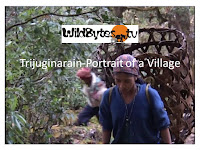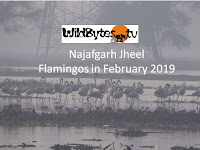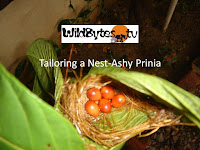Posted by
Susan Sharma
on
August 06, 2019
|
Posted by
Susan Sharma
on
March 07, 2019
Kew Botanical Garden in London-a window to the tropical section

Portrait of a Village - Trijugi Narayan in Rudra Prayag

Najafgarh Jheel Flamingos

Flamingo Count - Greater Flamingos of Okhla Bird Sanctuary

NOIDA Flower show-Snippets on co-operative farming, water gardening and butterfly gardening
Rudra Prayag-Three mighty Rivers in Uttarakhand, India

Tailoring a Nest- Ashy Prinia

|
Posted by
Susan Sharma
on
January 07, 2019
|
Posted by
Susan Sharma
on
December 11, 2018
|
Posted by
Susan Sharma
on
December 08, 2018

Wildbytes TV channel is now seen by nearly 70% of our members on their smart phones. Having crossed 1000 subscriptions to the channel, I have now produced a trailer video which recounts
the idea behind creating this channel. While the content in our online club is consumed by all age groups, the digital generation of 18 to 34 eagerly consume online videos.
Here is a link to the Trailer video. And yes, please do subscribe and click on the bell next to the subscribe button so that you are informed when we upload a new video.
https://www.youtube.com/watch?v=_MxkyLgtlNw

|
Posted by
Susan Sharma
on
December 01, 2018
|
Posted by
Susan Sharma
on
May 16, 2018
Our latest additions to IndianWildlifeClub You Tube channel can be viewed at
Please subscribe and write in your comments on the videos on the youtube page.
We are also in the process of making our own TV channel http://wildbytes.tv
mobile friendly! Over 140 videos have already been uploaded in our channel, each video covers some aspect of nature/wildlife. The videos include our documentaries on Corbett National park, Ranthambhore National Park, Chitwan National Park and Bukansan
National Park.
|
Posted by
Susan Sharma
on
January 25, 2018
I have uploaded over 100 videos relating to nature and wildlife in wildbytes Youtube channel. These videos are drawn from my experiences in various National Parks in India nad abroad plus videos of experts talking on related subjects wherever I could manage
hearing and recording them.
The channel is aimed at all nature lovers who care about the environment we live in.
It will be good if you can watch and write in your comments about the content of the videos. Many of you will have comments to add which will enrich the content in each video.
Please subscribe to the channel to be able to comment
https://www.youtube.com/channel/UCng_XfXfguqI-mX1x1xXdWA

|
Posted by
Susan Sharma
on
June 29, 2017


Nature lovers feel connected wherever they go! I experienced this lately when I visited my cousin who lives in far away San Diego. The cabbage butterfly I saw in the botanical garden of San Diego reminded me of Dr.Surya Prakash from whom I had learnt that
the Indian cabbage butterfly migrates by flying 300 to 400 miles a year. It is one of the three in India which migrate long distances. Want to learn more fascinating facts about butterflies from Dr. Surya Prakash? See the short film in our you tube channel
https://youtu.be/KLz3rsawl88
The sparrow happlily mud bathing on the ground of an open restaurant reminded me of the sparrows mud bathing back home. It also made me appreciate the fact that the restaurant owners who had grown local flowers all around, had made the ground inviting for
birds with leaf moulds and mulches.
On a cruise in the Soth Pacific Bay, the tour guide kept calling attention to the naval might of the USA and the ships and drones which had occupied the shores of the Bay. On one side a large group of Cormorants were busy fishing, reminding us how nature,
especially birds, can adapt anywhere. The sea lions displaced were huddled up on bait barges (because of which the cruise was called "Sea lion Cruise"). Having seen the interaction between a mum and pup sealions on the Pacific coast near the Torrey Pines
Reserve, the bait barges seemed like a zoo. Again, the foresightedness to put these barges for sea lions lazy enough not to go to other available shores? was worth appreciating.
Want to feel some of these emotions I went through? Watch the short film at
https://youtu.be/HYJ5kY1CSeQ

|
Posted by
Susan Sharma
on
June 25, 2017

Nature lovers feel connected wherever they go! I experienced this lately when I visited my cousin who lives in far away San Diego. The cabbage butterfly I saw in the botanical garden of San Diego reminded me of Dr.Surya Prakash
from whom I had learnt that the Indian cabbage butterfly migrates by flying 300 to 400 miles a year. It is one of the three in India which migrate long distances. Want to learn more fascinating facts about butterflies from Dr. Surya Prakash? See the short
film in our you tube channel
The sparrow happlily mud bathing on the ground of an open restaurant reminded me of the sparrows mud bathing back home. It also made me appreciate the fact that the restaurant owners who had grown local flowers all around,
had made the ground inviting for birds with leaf moulds and mulches.
On a cruise in the Soth Pacific Bay, the tour guide kept calling attention to the naval might of the USA and the ships and drones which had occupied the shores of the Bay. On one side a large group of Cormorants were busy
fishing, reminding us how nature, especially birds, can adapt anywhere. The sea lions displaced were huddled up on bait barges (because of which the cruise was called "Sea lion Cruise"). Having seen the interaction between a mum and pup sealions on the Pacific
coast near the Torrey Pines Reserve, the bait barges seemed like a zoo. Again, the foresightedness to put these barges for sea lions lazy enough not to go to other available shores? was worth appreciating.
Want to feel some of these emotions I went through? Watch the short film at
|